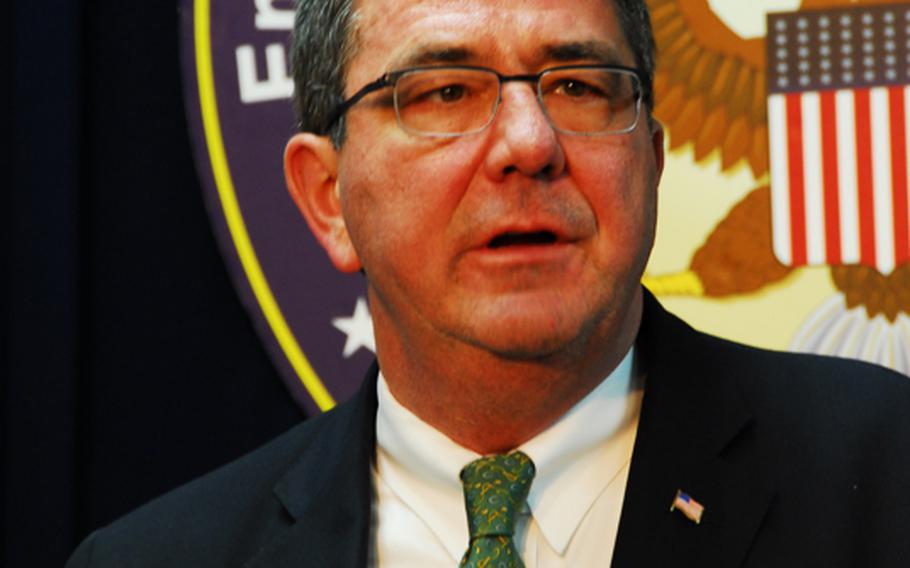
U.S. Deputy Secretary of Defense Ashton Carter speaks to reporters March 18, 2013, at the U.S. Embassy Annex in Seoul, where he met with South Korean government officials earlier in the day. He said deep cuts in the U.S. defense budget will not affect military operations in South Korea. (Ashley Rowland/Stars and Stripes)
SEOUL — A top defense official vowed Monday that defense spending cuts will not affect the U.S. military’s ability to respond to North Korean provocations or slow its strategic pivot toward Asia.
“The Asia-Pacific rebalance is a priority,” Deputy Defense Secretary Ashton Carter told reporters in Seoul. “It’s a historic priority. We have the resources to accomplish it…no matter what happens in the budget debate that’s going on in the United States.”
Carter described sequestration as “temporary budget turbulence imposed by the Congress” and said that while he does not know how lawmakers would shape the defense budget for the next fiscal year, it would be adequate to support the rebalance to Asia and operations in South Korea.
“We will deal with that turmoil in a way that does not affect the Korean peninsula,” he said. “That’s the direction that has been given, so operations and actions on the Korean peninsula are not affected.”
He noted that the U.S. does not plan to ask Seoul – which pays for a portion of the cost of stationing U.S. troops in the country – for additional funding because of sequestration, adding that the end of operations in the Middle East means “we are able to shift a great amount of military weight from Iraq and Afghanistan to the Asia-Pacific region.”
Carter also had strong words for North Korea, which in recent weeks has leveled a number of threats at the U.S. and South Korea, including a promise of retaliation for the Key Resolve and Foal Eagle joint exercises being conducted this month.
Pyongyang also has declared invalid the armistice that ended the Korean War.
Many analysts fear the recent uptick in angry rhetoric indicates that Pyongyang may soon conduct an attack against the South.
“If North Korea thinks this kind of thing is going to get them anywhere, they’re mistaken,” Carter said.
The U.S. announced Friday it will increase its intercontinental ballistic missile defenses in response to North Korea’s nuclear program. Pyongyang last month conducted its third and apparently most successful nuclear test, following a long-range rocket launch in December.
Carter said the U.S. also will continue to provide to South Korea “the extended deterrence offered by the U.S. nuclear umbrella, and we will ensure that all of its capabilities remain available to the alliance.”
Carter’s visit to Asia, which includes stops in Japan, the Philippines and Indonesia, is allowing him to consult with officials about security issues and the U.S. rebalance to Asia.
He met Monday with members of new South Korean President Park Geun-hye’s administration, where he said a key topic of discussion was North Korea. He planned to travel to Command Post Tango on Monday afternoon with U.S. Forces Korea commander Gen. James Thurman to meet with troops and observe the ongoing Key Resolve exercise.